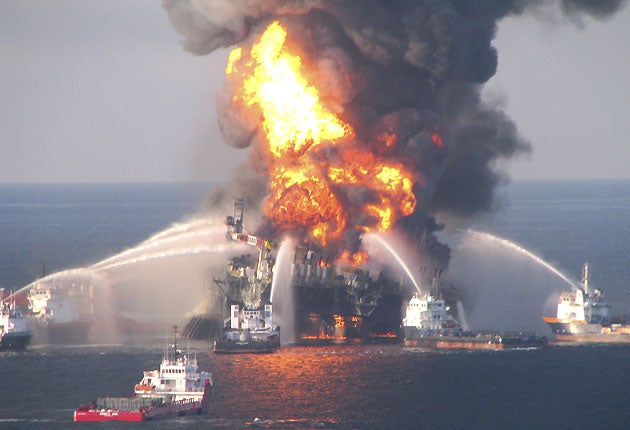Oil pollution fears after blazing rig sinks

A crew member from an oil platform that sank off the Louisiana coast last night reported an initial explosion three hours before the rig went up in flames in a second, larger explosion, the Coast Guard said.
Coast Guard Senior Chief Petty Officer Mike O'Berry told The Associated Press that according to their internal reports, the first blast was reported at 7 p.m. CDT Tuesday. Three hours later, the rig sent an emergency signal that's "like a panic button," he said.
At the same time, a nearby rig called to report the Deepwater Horizon was engulfed in flames, O'Berry said. The rig did not ask for help during the initial call, but the Coast Guard sent crews after the emergency signal came.
The Coast Guard is investigating what happened during that span.
"That three-hour window is obviously stuff being investigated — what happened during that time," O'Berry said.
The company that owns the rig also was looking into it.
"Any events that were logged are part of the ongoing investigation, and we are not commenting on them at this time," Guy Cantwell, spokesman for Transocean Ltd. wrote in an e-mail to The Associated Press.
The Deepwater Horizon, about 40 miles (64 kilometers) southeast of the mouth of the Mississippi River, burned for more than a day before sinking late Thursday morning. Of the crew of 126, 11 were reported missing and 17 were injured, four critically. More than 100 escaped.
The sinking of the rig could unleash more than 300,000 gallons (1,135,600 liters) of crude a day into the water. The environmental hazards would be greatest if the spill were to reach the Louisiana coast.
Crews searched by air and water for the missing workers, hoping they had managed to reach a lifeboat, but one relative said family members have been told it's unlikely any of the missing survived the blast. The Coast Guard found two lifeboats but no one was inside.
Carolyn Kemp said her grandson, 27-year-old Roy Wyatt Kemp was among the missing. She said he would have been on the drilling platform when it exploded.
"They're assuming all those men who were on the platform are dead," Kemp said. "That's the last we've heard."
Jed Kersey said his 33-year-old son, John, had finished his shift on the rig floor and was sleeping when the explosion happened. He said his son told him that all 11 missing workers were on the rig floor.
"He said it was like a war zone," said Jed Kersey, a former offshore oil worker.
An alarm sounded and the electricity went out, sending John Kersey and other workers scurrying to a lifeboat that took them to a nearby service boat, his father said.
"They waited for as many people as they could," Jed Kersey said. He said his son wasn't ready to talk publicly about his experience.
As the rig burned, supply vessels shot water into it to try to keep it afloat and avoid an oil spill, but there were additional explosions Thursday. Officials had previously said the environmental damage appeared minimal, but new challenges have arisen now that the platform has sunk.
The well could be spilling up to 336,000 gallons (1,271,860 liters) of crude oil a day, Coast Guard Petty Officer Katherine McNamara said. She said she didn't know whether the crude oil was spilling into the gulf. The rig also carried 700,000 gallons (2,649,700 liters) of diesel fuel, but that would likely evaporate if the fire didn't consume it.
Join our commenting forum
Join thought-provoking conversations, follow other Independent readers and see their replies
Comments
Bookmark popover
Removed from bookmarks